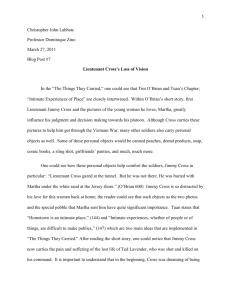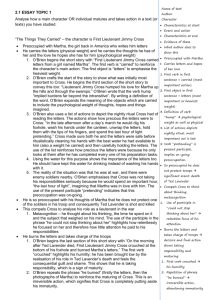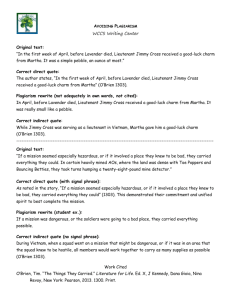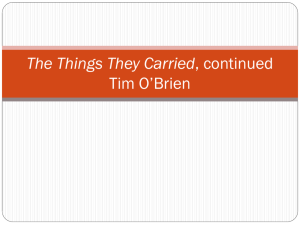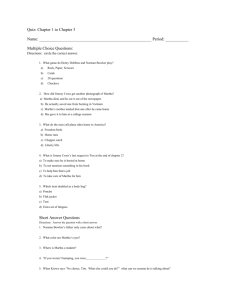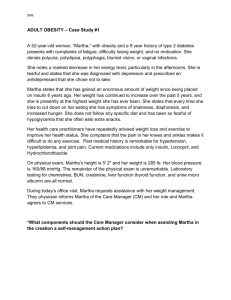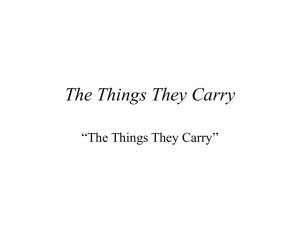Non-Fiction—Third Place Rebecca Parra I’m So Heavy
advertisement
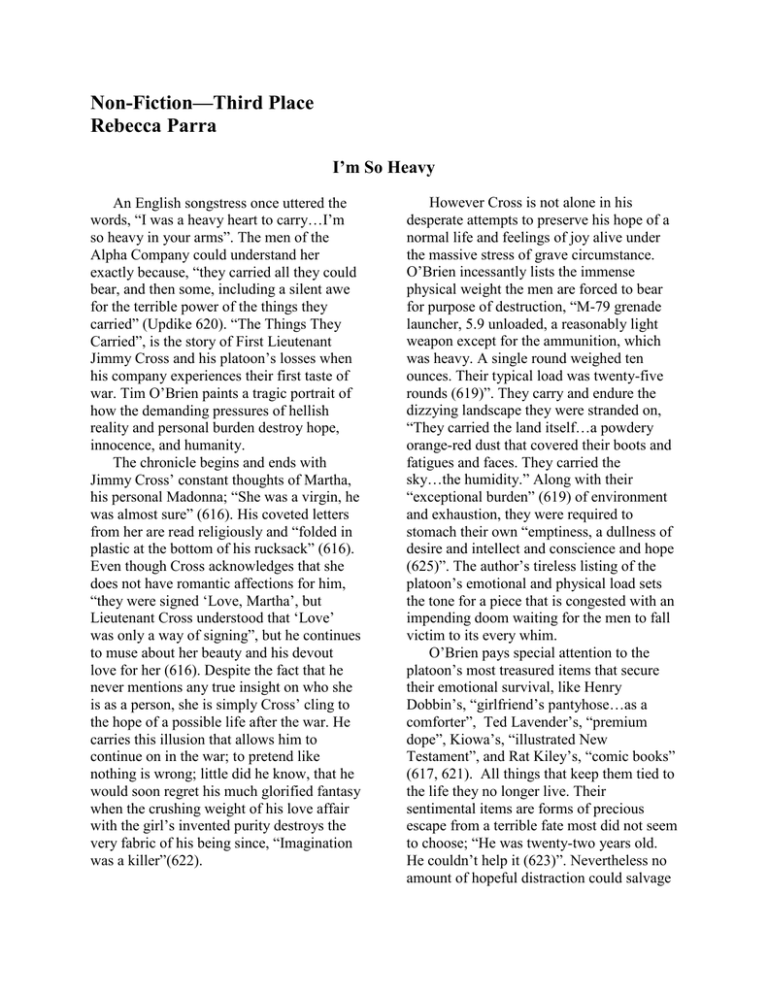
Non-Fiction—Third Place Rebecca Parra I’m So Heavy An English songstress once uttered the words, “I was a heavy heart to carry…I’m so heavy in your arms”. The men of the Alpha Company could understand her exactly because, “they carried all they could bear, and then some, including a silent awe for the terrible power of the things they carried” (Updike 620). “The Things They Carried”, is the story of First Lieutenant Jimmy Cross and his platoon’s losses when his company experiences their first taste of war. Tim O’Brien paints a tragic portrait of how the demanding pressures of hellish reality and personal burden destroy hope, innocence, and humanity. The chronicle begins and ends with Jimmy Cross’ constant thoughts of Martha, his personal Madonna; “She was a virgin, he was almost sure” (616). His coveted letters from her are read religiously and “folded in plastic at the bottom of his rucksack” (616). Even though Cross acknowledges that she does not have romantic affections for him, “they were signed ‘Love, Martha’, but Lieutenant Cross understood that ‘Love’ was only a way of signing”, but he continues to muse about her beauty and his devout love for her (616). Despite the fact that he never mentions any true insight on who she is as a person, she is simply Cross’ cling to the hope of a possible life after the war. He carries this illusion that allows him to continue on in the war; to pretend like nothing is wrong; little did he know, that he would soon regret his much glorified fantasy when the crushing weight of his love affair with the girl’s invented purity destroys the very fabric of his being since, “Imagination was a killer”(622). However Cross is not alone in his desperate attempts to preserve his hope of a normal life and feelings of joy alive under the massive stress of grave circumstance. O’Brien incessantly lists the immense physical weight the men are forced to bear for purpose of destruction, “M-79 grenade launcher, 5.9 unloaded, a reasonably light weapon except for the ammunition, which was heavy. A single round weighed ten ounces. Their typical load was twenty-five rounds (619)”. They carry and endure the dizzying landscape they were stranded on, “They carried the land itself…a powdery orange-red dust that covered their boots and fatigues and faces. They carried the sky…the humidity.” Along with their “exceptional burden” (619) of environment and exhaustion, they were required to stomach their own “emptiness, a dullness of desire and intellect and conscience and hope (625)”. The author’s tireless listing of the platoon’s emotional and physical load sets the tone for a piece that is congested with an impending doom waiting for the men to fall victim to its every whim. O’Brien pays special attention to the platoon’s most treasured items that secure their emotional survival, like Henry Dobbin’s, “girlfriend’s pantyhose…as a comforter”, Ted Lavender’s, “premium dope”, Kiowa’s, “illustrated New Testament”, and Rat Kiley’s, “comic books” (617, 621). All things that keep them tied to the life they no longer live. Their sentimental items are forms of precious escape from a terrible fate most did not seem to choose; “He was twenty-two years old. He couldn’t help it (623)”. Nevertheless no amount of hopeful distraction could salvage their minds from the poisonous affects of bloodshed. “…when Strunk made that happy moaning sound, when he went Ahhooooo, right then Ted Lavender was shot in the head on his way back from peeing” (623). This alone is the story’s great catalyst; it is proof that all of Alpha company’s fears have been realized, a perfect illustration of the many ways war can choose to claim you. The event of having witnessed the death of one of their own, results in Cross’ grasp that he has been fooling himself; “He hated himself. He had loved Martha more than his men” (626). Cross believes that had he not been distracted with thoughts of Martha as a means of escape during the tense tunnel missions, he perhaps could have done something to save a man he was responsible for. He is overcome with shame for this vigorous preservation of a future that never existed, “she belonged to another world, which was not quite real…she didn’t love him and never would”, but most of all, that Lavender could still be alive had he not daydreamed about it (626). His once hopeful mind had blood on it but when Cross manifests his grief, “he sat at the bottom of his foxhole and wept…In part, he was grieving for Ted Lavender, but mostly it was for Martha (626)”. Cross is mourning the loss of his only beckon of sanity and expressing the guilt that will remain with him “for the rest of the war (626)”. The First Lieutenant lost his only extension to the outside world, but decides to carry, “all the emotional baggage of men who might die” (628). While the rest of the company is still shocked about the way Lavender passed, according to Kiowa’s description, “Boomdown... Like cement. (620)” Although none of the men feel hurt by the event, not even the “devout Baptist” (617); Alpha Company decides to plainly relish in their own good fortune of not being the-first-dead-guy, “all he could think was Boom-down, and all he could feel was the pleasure of having his boots off” (627). Evidently the platoon seems to still have some shred of hope in them but it comes at a price. Having only experienced one death among their lot, and only a mess of fears, the company refuses to mourn the loss of a human life. They have adopted the most primal of mottos, “survival of the fittest”; selfishness was now another thing to carry and perhaps the one that could end them all. The thumb is one of most powerful symbols in the entire piece; “the thumb was dark brown, rubbery to the touch, and weighed 4 ounces” (623). It is the thumb of a Vietnamese boy the platoon found dead in a ditch, Henry Dobbins removed it and gave it to Norman Bowker, and all while “Mitchell Sanders said, there’s a definite moral here” (624). Sanders could not be more correct and he is the only one to ever ask them to think of the meaning behind their actions. Alpha company has slowly become animalistic. By removing the young boy’s thumb, they dehumanized themselves and the young boy. War had now claimed their humanity, right and wrong was almost no longer comprehendible. They no longer carried emotion; they only carried a will to live: “It was not courage, exactly; the object was not valor” (629). The challenge of Vietnam was not to win the war but if they could bear the weight of their remaining civility and humanity. That was the “moral” they decided to go on without; “Smiling, he kicked the boy’s head, watched the flies scatter…Henry Dobbin’s thought about it. Yeah, well, he finally said. I don’t see no moral. There it is, man. Fuck off” (624). O’Brien lists their weapons excessively for so much more than description. Those weapons are intended to become each man’s “defense mechanism”, a mechanism that every animal on the planet Earth has, with the grand exception of humans. We became the dominant species because of our minds and thumbs. The men having already symbolically defiled the human thumb, they also allowed their minds to go when it is over powered by the instinct of survival, “Rather, they were too frightened to be cowards” (629). As the narrative comes to a close, Jimmy Cross is busy burning Martha’s letters and photographs which represented a small loss of humanity but also an acceptance of severe circumstance; “The morning came up wet and blurry. Everything seemed part of everything else, the fog and Martha and the deepening rain. It was war, after all” (630). He understood that his first priority had to be the survival of the men he was expected to lead and knew that he could no longer dream in a place so astonishingly real. “It was very sad, he thought…The things men did or felt they had to do” (631). His act is noble because he carefully assumes his responsibility and in order for him to serve his men properly, he can never be distracted. Which is why he had to rid himself of Martha’s fantasy; he was at war and the lives of his men and his own were all he had. “They would never be at a loss for things to carry (625)”. This account creates an atmosphere and war story that chooses to expose how the anxiety of war is amplified for those fighting it. Many times stories of war are told through the death toll or the blood-soaked fields or great acts of valor. This one involves people, not soldiers, but young inexperienced men with great flaws and little courage and just how their minds and human qualities crumble in the presence of war. This occurs and nevertheless these men are forced to carry on despite their shattered souls. War itself asks these men the questions from the songstress’ final words, “All of this killing time? Are you strong enough to stand?” Works Cited O’Brien, Tom. “The Things They Carried.” The Best American Short Stories of the Century. Boston: Houghton,1999. 61632. Print.
